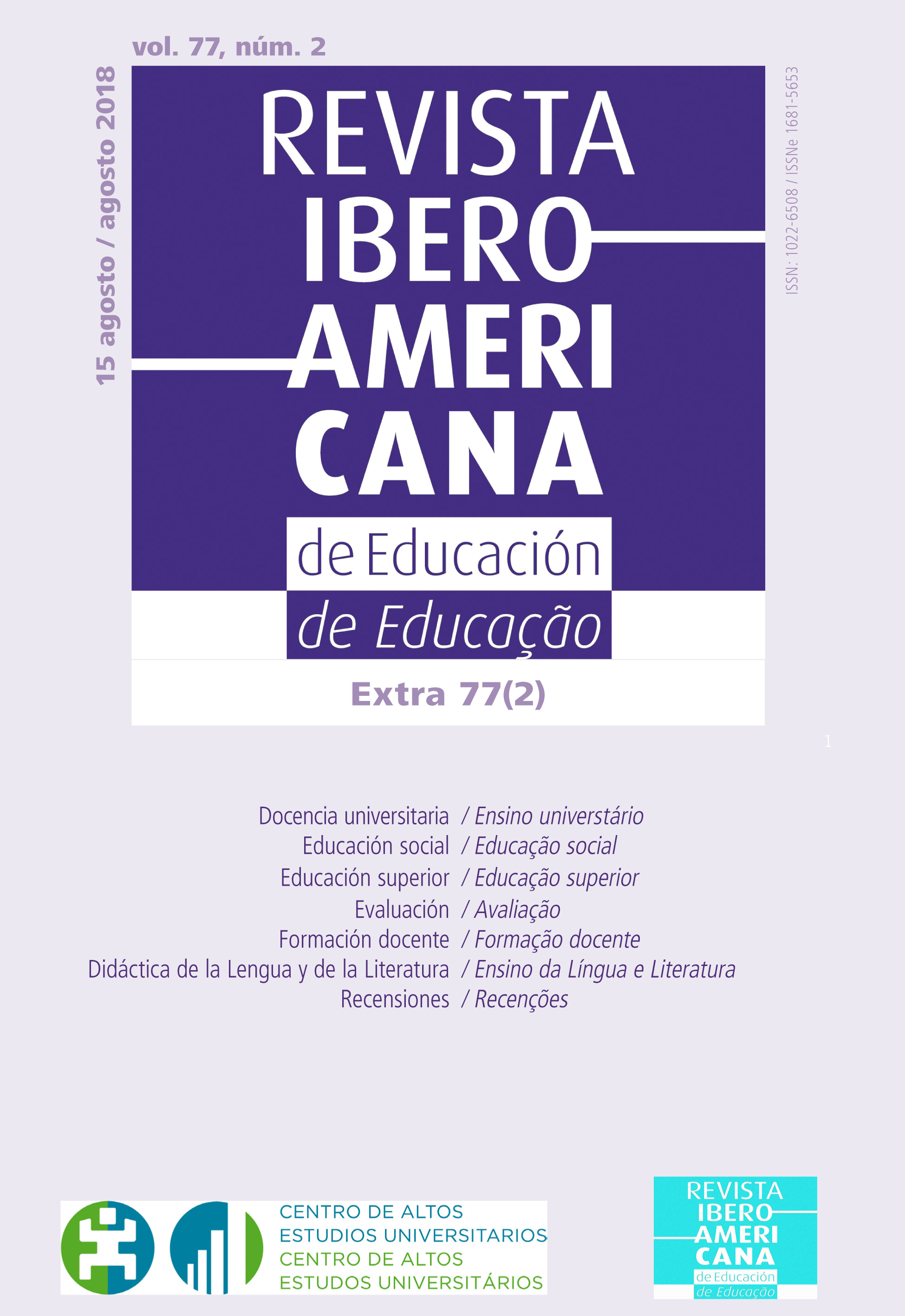Social origin and school processes in Paraguay. Factors associated to the academic performance in reading and mathematics of third grade students
DOI:
https://doi.org/10.35362/rie7723175Keywords:
associated factors, educational inequality, academic performance, reproduction, school effectivenessAbstract
This is a quantitative study of explanatory scope realized with information provided by The Latin American Laboratory of Evaluation of the Educational Quality (LLECE)-UNESCO with the purpose of establishing and comparing context and process factors associated with performance in the TERCE assessment of Reading and Mathematics learning by 3rd graders in school institutions of the Republic of Paraguay during the year 2013.
For this purpose, 2759 exams were analyzed together with the information of self-administered questionnaires to the student, his family, the classroom teacher and the director of 200 educational establishments.
For the estimation of the associated factors a hierarchical linear model was used that established as factors of greater association, with the performance in the Reading and Mathematics assessments, the Cultural Capital of the student, the School Resource Materials and to a lesser extent the Class Climate. In addition, reading is significantly associated with the director's management -with negative effect-, the social origin of the student and the school's habitat. Likewise, the differential incidences of the categories (high / low) of the contextual factors (social origin, cultural capital, classroom environment, habitat, dependency and material resources) among the test performances were significant (p <0.01).
The main findings of the research show two main strategies for reproducing inequalities in performance: the family and the school system. The relational dynamic in the educational process slows down for some students and promotes for others the development of school effectiveness. School processes operate on basis of these unequal social relations and reaffirm the explanation that the variability in performance is not concentrated in the school.
Downloads
References
Bogoya, D. (2009). Factores Asociados al Logro Académico. Caso Colombia en el SERCE. Grupo de Investigación en Evaluación de la Universidad Nacional de Colombia. Disponible en: https://sites.google.com/a/unal.edu.co/danielbogoya/3-documentos-de-trabajo.
Bogoya, D., Barragán, S., Contento, M., Ocaña, A. (2014). Calibración de instrumentos de evaluación. Clasificación en matemáticas en la Universidad Jorge Tadeo Lozano. Revista Complutense de Educación, 25(2).
Bourdieu, P-F., Passeron, J-C. (1996). La Reproducción. Elementos para una teoría del sistema de enseñanza. Distribuciones Fontamara. México.
Bourdieu, P. (1997). Razones prácticas. Barcelona: Anagrama.
Bourdieu, P. (2005). Capital cultural, escuela y espacio social. México: Siglo XXI.
Cervini, R. (2002). Desigualdades en el logro académico y reproducción cultural en Argentina. Revista Mexicana de Investigación Educativa, 7 (16), 445-500.
Coleman, J. S. et al. (1966). Equality of Educational Opportunity. National Center for Educational Statistics.
Fernández, T., (2004). Distribución del conocimiento escolar: clases sociales, escuelas y sistema educativo en América Latina. Tesis de Doctorado. Centro de Estudios Sociológicos. México.
Hanushek, E. A. & Wößmann, L. (2007). Education Quality and Economic Growth. The World Bank
Hanushek, E. A. (2016). School human capital and teacher salary policies. Journal of Professional Capital and Community, 1 (1), 23-40.
Herrera, S. (2010). La importancia de la educación en el desarrollo: la Teoría del Capital Humano y el Perfil Edad, Argentina. Revista Pilquen, 13, 00. Disponible en http://www.scielo.org.ar/scielo.php?script=sci_arttext&pid=S1851-31232010000200007&lng=es&tlng=es.
Martínez-Garrido, C. (2011). 25 Investigaciones clave sobre eficacia escolar. Profesorado. Revista de currículum y formación del profesorado, XV (3).
MEC (2011). Plan Nacional de Educación 2024. Hacia el centenario de la Escuela Nueva de Ramón Indalecio Cardozo. Asunción-Paraguay.
MEC (2014). Agenda Educativa 2013-2018. Asunción-Paraguay.
Misiego, P. A, (2014) Los desafíos de la docencia frente a las infancias excluidas y relegadas. Asunción del Paraguay: Instituto Desarrollo.
Murillo Torrecilla, F. (2003). Una panorámica de la investigación iberoamericana sobre eficacia escolar. REICE. Revista Electrónica Iberoamericana sobre Calidad, Eficacia y Cambio en Educación, 1 (1), .Disponible en: http://www.ice.deusto.es/rinace/reice/vol1n1/Murillo.pdf.
Ortiz, L. (2012). Educación y Desigualdad. Las clases desfavorecidas ente el Sistema educativo paraguayo. Asunción: CEADUC–Centro de Estudios Antropológicos de la Universidad Católica “Nuestra Señora de la Asunción”, Asunción.
Ortiz, L. (2012). “Reforma educativa y conservación social. Aspectos sociales del cambio educativo en Paraguay”. Revista Latinoamericana de Estudios Educativos, XLII (4), 55-90.
Ortiz, L. (2013). Ética, trabajo y examen La formación de la disposición escolar en medios sociales desfavorecidos. Perfiles Educativos, XXXVI (143), 2014. IISUE-UNAM.
Ortiz, L. (2014). “La educación escolar ante los límites de la inequidad”. Debate. Revista digital de políticas públicas, (3), 4-10.
Ortiz, L. (2015). El Capital cultural a prueba. Notas provisorias sobre la desigualdad de aprendizajes. Revista Acción. Marzo de 2015. Nº 352.
UNESCO-OREALC (2010). Factores Asociados al logro cognitivo de los Estudiantes de América Latina y el Caribe en SERCE – Segundo Estudio Regional Comparativo Explicativo. LLECE de OREALC. Santiago, Chile
UNESCO-OREALC (2014). Primera entrega de resultados del tercer estudio regional comparativo y explicativo (TERCE). Santiago, Chile
UNESCO-OREALC (2015). Informe de resultados: logros de aprendizaje. Resumen ejecutivo.OREALC/UNESCO. Santiago, Chile.
UNESCO-OREALC (2016). Reporte técnico. Tercer Estudio Reginal Comparativo y Explicativo, TERCE. Santiago, Chile.
How to Cite
Downloads
Published
Issue
Section
License
Any authors who publish with this journal accept the following terms:















